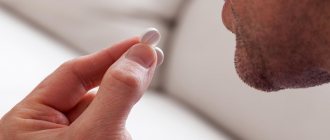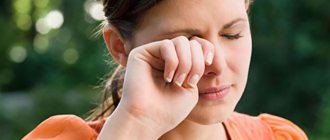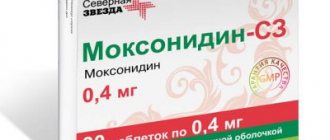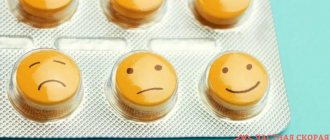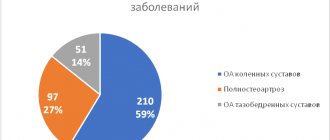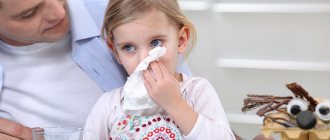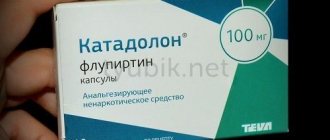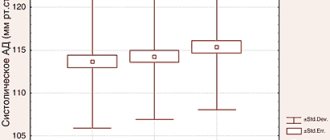Depression is one of the most common diseases. In terms of prevalence, it is second only to cardiovascular diseases. And of all those suffering from depression, no more than 20% seek qualified help.
In this article we will tell you about all the drugs used to treat depression.
All medications with antidepressant effects can be divided into several groups:
- Antidepressants.
- Normotimic drugs.
- Neuroleptics.
- Tranquilizers.
- Nootropics and metabolic agents.
- Herbal remedies.
- Amino acids.
- Psychostimulants.
Normotimic drugs
Medicines in this group have an antidepressant effect only in cases where the depressive state is caused by chronic affective diseases, such as bipolar affective disorder (BD, manic-depressive psychosis), cyclothymia, dysthymia, schizoaffective disorder. Most commonly used medications:
- Carbamazepine (finlepsin)
- Depakine chrono
- Lamotrigine (Lamictal)
- Lithium carbonate
Review of “calming” antidepressants
These are antidepressants with a pronounced sedative effect. They are well suited for people with anxiety disorders, obsessive thoughts, and sleep disorders.
Fluvoxamine
Popularity rating*: 4.3
Trade name: Fevarin.
A modern drug that does not yet have generics. It perfectly restores sleep, which, however, can result in problems with awakening and drowsiness during the day. Approved for use in children, but only for the treatment of obsessive-compulsive disorders (obsessive states). And in principle, judging by the reviews of doctors, it is more effective for treating obsessive-compulsive disorders than depression. It also works well in the treatment of post-traumatic stress disorder.
Not recommended for pregnant and lactating women.
You can drive a car no earlier than 2 weeks from the start of taking the drug - when the absence of side effects in the form of drowsiness is obvious.
Due to the fact that there are no generic versions of this antidepressant, it is not cheap: about 1000 rubles for 15 tablets.
Advantages
- effective for obsessive states.
Flaws
- high price.
Trazodone
Popularity rating*: 4.2
Trade name: Trittiko.
Another relatively new antidepressant that does not yet have generics.
It normalizes sleep well and reduces anxiety. Unlike most antidepressants, it does not reduce sexual desire, but, on the contrary, enhances it.
Not recommended for children, pregnant or lactating women. May cause drowsiness, so you should only drive after several weeks of use, when the absence of side effects is obvious.
Advantages
- does not cause a decrease in libido.
Flaws
- high price.
Amitriptyline
Popularity rating*: 4.1
At first glance, this medicine has absolutely nothing to do in a review of antidepressants. The first generation medicine has many side effects, the mildest of which is constant drowsiness, which is addictive. But this is the only antidepressant that not only can, but also should be prescribed to people with suicidal tendencies. It is this state of “drowning”, which almost everyone who has taken amitriptyline complains about, that will save the patient from an irreparable step. Most often, the drug is recommended in combination with other antidepressants and gradually discontinued as the other drug begins to act effectively.
Advantages
- allowed for suicidal tendencies,
- effective for pain syndromes,
- cheap.
Flaws
- addictive,
- a lot of side effects.
*The popularity rating is based on an analysis of demand data from the wordstat.yandex.ru service.
Neuroleptics
Despite the fact that most antipsychotic drugs depress the nervous system, among them there are drugs with antidepressant effects:
- Flupenthixol (fluanxol).
It has an antidepressant effect only when administered in small doses (less than 2 mg per day).
- Aripiprazole.
Effective for depression in bipolar affective disorder and schizitypal disorders.
- Levomepromazine (tizercin).
Prescribed for endogenous depression accompanied by insomnia.
Life in the “serotonin pit”
An alternative to the monoamine theory, which from the point of view of many scientists can no longer be considered basic, is the biopsychosocial model of depression. In accordance with it, the development of the disease is influenced not only by biological, but also by psychological factors.
“A person may experience loss (grief) or severe frustration of their needs (stress). As a result, its neurochemistry also changes,” explains Danina. “But this is the so-called normal “grieving process.” Doctors talk about reactive depression only if, even after months, a person continues to experience the same unpleasant sensations, and over time his condition only gets worse.”
In some people, however, the functional characteristics of their neurons make them more susceptible to depression. Such patients do not require external circumstances to “start” the process. And their depression is not reactive, “endogenous” in nature.
In both cases, as a medical treatment, in addition to psychotherapy, doctors prescribe antidepressants, that is, drugs that can affect neurotransmitters in the brain.
There are five classes in total. Each of which affects the brain in its own way.
1. Selective serotonin reuptake inhibitors (SSRIs).
SSRI drugs increase serotonin levels. Which helps to more accurately regulate mood and gradually overcome moderate and severe depression. These drugs do their job by preventing neurons from taking up serotonin from the synaptic cleft between neurons. Due to this, neurons are able to exchange information better.
SSRIs have fewer side effects than other classes of antidepressants. For example, in case of overdose, they do not disrupt cardiac conduction and do not lead to seizures.
However, there are still side effects and they are quite serious - from increased suicidal thoughts to sexual dysfunction, drowsiness, dry mouth, dizziness and headaches.
In addition, all drugs that increase serotonin levels in the brain can cause serotonin syndrome, a situation where there is too much of the neurotransmitter.
Serotonin and signal transmission along nerve cells.
With serotonin syndrome, a person becomes overexcited, restless, suffers from sweating and increased heart rate. This is why being treated simultaneously with two antidepressants that increase serotonin levels is dangerous to life and health.
2. Selective serotonin and norepinephrine reuptake inhibitors (SNRIs).
SNRIs work in much the same way as SSRIs, but with one difference. Medicines “prohibit” neurons from absorbing not only serotonin, but also norepinephrine, a neurotransmitter that is involved in the regulation of emotions and thought processes.
And since norepinephrine works closely with serotonin and dopamine, SNRIs are believed to increase attention, focus, and improve memory.
The indications and side effects of SNRIs are very similar to SSRIs. Drugs in this class have few advantages over SSRIs, but they are better for some patients.
3. Atypical antidepressants.
This class includes drugs with different principles of action, which have only one thing in common - these drugs are not similar to SSRIs and SNRIs.
Although some drugs in this class also “prohibit” neurons from taking up serotonin, like reuptake inhibitors, some of them can affect receptors for other neurotransmitters. This makes it possible to fine-tune the sensitivity of neurons to one or another substance.
It is worth noting that the components of some atypical antidepressants - for example, bupropion - are indicated in a note to the list of psychotropic substances subject to control on the territory of the Russian Federation. And although this product has been approved by reputable international medical organizations - for example, the American Food and Drug Administration (FDA), it cannot be legally purchased in Russia.
Side effects for this class of drugs vary depending on the specific drug. For example, some atypical antidepressants make you sleepy, while others, on the contrary, invigorate you. To choose the right medicine, the doctor must take into account the specifics of the legislation, individual symptoms and the patient’s health condition.
4. Tricyclic antidepressants (TCAs).
All drugs in this class are thought to increase norepinephrine and serotonin levels in the brain, much in the same way as SNRIs do.
But TCAs have a very important difference - they are able to act on brain receptors that bind to other substances. In case of overdose, this leads to severe side effects - for example, seizures and complete heart block. And although TCAs are quite effective, today they try to use drugs from this group as rarely as possible.
5. Monoamine oxidase inhibitors (MAOIs).
Drugs in this class “turn off” monoamine oxidase, an enzyme that breaks down norepinephrine, serotonin and dopamine in the brain. As a result, neurotransmitters are not destroyed and remain in the synaptic cleft for a long time.
Unfortunately, MAOIs have many side effects, including high blood pressure, weight gain, swelling, sexual dysfunction, and suicidal thoughts. So medications of this class today are used only under strict medical supervision and as a last resort - if other antidepressants have not helped.
Tranquilizers
- Bromodihydrochlorophenylbenzodiazepine (phenazepam).
The drug of choice for neurotic conditions with depression and post-stress conditions. That is, in cases where short-term treatment is required.
- Clonazepam.
Strong anti-anxiety and sedative effect. When taken for a long time it causes dependence.
- Alprazolam.
Prescribed for anxiety and depression. Recommended for short courses (no more than 10 days) due to the risk of developing addiction and dependence.
What are antidepressants and when are they prescribed?
The functioning of our brain, including the general background of mood and emotions, depends on the content of special substances in it - neurotransmitters. One of these substances, serotonin, is called the hormone of joy. It maintains a good mood and creates a feeling of happiness. In people with depression, serotonin levels decrease.
These are purely biochemical processes, and telling a person suffering from depression due to low serotonin levels to “just pull yourself together and start moving” is about as productive as telling a patient with diabetes to maintain the desired sugar level through willpower.
Antidepressants increase the amount of serotonin in the body, restoring a person’s “normal” state.
By the way, they are prescribed not only to lift your mood. Another common area for the use of antidepressants is chronic pain (back pain, headaches, fibromyalgia, irritable bowel syndrome pain, etc.). Against the background of constant pain, the synthesis of the body’s own painkillers is disrupted; doctors call this dysfunction of the antinociceptive system. Antidepressants restore natural pain suppression mechanisms. Moreover, if their main effect - improving mood - takes 2-3 weeks, then the analgesic effect appears literally with 1-2 tablets.
Antidepressants are also recommended for anxiety disorders, premenstrual and premenopausal syndromes, urinary and fecal incontinence, and other pathologies.
Nootropics and Metabolic Aids
The remedies in this group help to get out of a depressive state that has developed against the background of stress, overwork, encephalopathy, the consequences of injuries and poisoning. By improving the blood supply to neurons and energy metabolism within cells, they contribute to the activation of cognitive functions and memory. The most effective drugs in this group:
- Phenibut
- Mexidol
- Aminalon (GABA)
- Piracetam (nootropil)
- Picamilon
- Pyriditol (encephabol)
- B vitamins.
Are there non-drug treatments for depression?
In addition to medications, there are many non-drug treatments for depression. These are psychotherapy, biofeedback therapy, diet therapy, physical therapy, exercise therapy, reflexology, light and color therapy, sleep deprivation, etc. Most often, a combination of several methods is used to treat depression. For example: psychotherapy + drug treatment, biofeedback therapy + psychotherapy, medication + diet therapy, etc.
You cannot prescribe or use medications on your own. If you or your loved one is faced with the problem of depression, you need to see a psychiatrist or psychotherapist! Only according to his recommendations can you use drugs. Self-medication is life-threatening!
Review of modern antidepressants
| Nomination | place | Name of product | price |
| Review of “neutral” antidepressants | 1 | Sertraline | 568 ₽ |
| 2 | Venlafaxine | 348 ₽ | |
| 3 | Escitalopram | 507 ₽ | |
| 4 | Duloxetine | 641 ₽ | |
| antidepressants with an “invigorating” effect | 1 | Fluoxetine | 51 ₽ |
| 2 | Paroxetine | 322 ₽ | |
| "calming" antidepressants | 1 | Fluvoxamine | 758 ₽ |
| 2 | Trazodone | 754 ₽ | |
| 3 | Amitriptyline | 59 ₽ |
